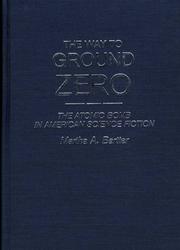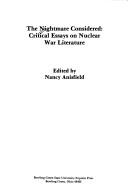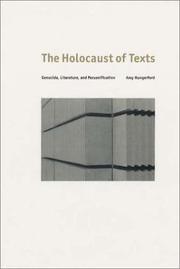| Listing 1 - 10 of 11 | << page >> |
Sort by
|
Book
ISBN: 0906890926 Year: 1986 Publisher: London Comedia publishing group
Abstract | Keywords | Export | Availability | Bookmark
 Loading...
Loading...Choose an application
- Reference Manager
- EndNote
- RefWorks (Direct export to RefWorks)
Nuclear warfare in literature --- Briggs, Raymond --- -Adaptations --- Briggs, Raymond. --- Adaptations.

ISBN: 0313258929 Year: 1988 Publisher: New York ; Westport ; London Greenwood Press
Abstract | Keywords | Export | Availability | Bookmark
 Loading...
Loading...Choose an application
- Reference Manager
- EndNote
- RefWorks (Direct export to RefWorks)

ISBN: 0879725303 Year: 1991 Publisher: Bowling Green (Ohio) : Bowling Green State University Popular Press,
Abstract | Keywords | Export | Availability | Bookmark
 Loading...
Loading...Choose an application
- Reference Manager
- EndNote
- RefWorks (Direct export to RefWorks)
Book
ISBN: 9783937384481 3937384480 Year: 2008 Publisher: Marbach am Neckar : Deutsche Schillergesellschaft,
Abstract | Keywords | Export | Availability | Bookmark
 Loading...
Loading...Choose an application
- Reference Manager
- EndNote
- RefWorks (Direct export to RefWorks)
Book
ISBN: 2738155065 Year: 2021 Publisher: Odile Jacob
Abstract | Keywords | Export | Availability | Bookmark
 Loading...
Loading...Choose an application
- Reference Manager
- EndNote
- RefWorks (Direct export to RefWorks)
This book looks at representations of nuclear weapons in art and culture, and how they shape our perceptions and collective imagination. Bringing together 35 authors with very diverse profiles and modes of expression (researchers, diplomats, artists, critics, curators, etc.), such as cartoonist, Plantu, or director, Antonin Baudry (Le Chant du Loup), it draws up a vast and inviting panorama to think about the representation of the nuclear weapon; to read the literary works, the novels, the comic strips which depict it; watch the bomb on the big and small screen; listen to it in song; play video games that depict it; the photography that illustrates it; the architecture that anticipates it; and the national propaganda that exploits its threat. This unique set and the 170 illustrations that accompany it make this book a singular reference work.
Book
ISBN: 9780719077128 0719077125 Year: 2008 Publisher: Manchester : Manchester University Press :,
Abstract | Keywords | Export | Availability | Bookmark
 Loading...
Loading...Choose an application
- Reference Manager
- EndNote
- RefWorks (Direct export to RefWorks)
"When the atomic bomb exploded over Hiroshima on 6 August 1945, it not only signalled the final phase of the Second World War, it also precipitated a nuclear age that shaped the Cold War and post-Cold War periods. States of Suspense is about the representation of this nuclear age in United States literature from 1945-2005. The book will be of interest to students and scholars of American literature, and postmodern and technological culture. It will also be of interest to those more generally intrigued by the cultural fallout of the nuclear age."--Jacket.
American literature --- American literature --- American literature. --- Atomic bomb in literature. --- Atomic bomb in literature. --- Atomkrieg (Motiv). --- Atomkriegsgefahr (Motiv). --- Literatur. --- Nuclear warfare in literature. --- Nuclear warfare in literature. --- Postmodernism (Literature) --- Postmodernism (Literature). --- History and criticism --- History and criticism --- 1900-2099. --- Geschichte 1945-2005. --- USA. --- United States.
Book
ISBN: 9781517908744 9781517908737 1517908744 1517908736 Year: 2020 Publisher: Minneapolis ; London : University of Minnesota Press,
Abstract | Keywords | Export | Availability | Bookmark
 Loading...
Loading...Choose an application
- Reference Manager
- EndNote
- RefWorks (Direct export to RefWorks)
Since 1945, America has spent more resources on nuclear technology than any other national project. Although it requires a massive infrastructure that touches society on myriad levels, nuclear technology has typically been discussed in a limited, top-down fashion that clusters around powerful men. In Infrastructures of Apocalypse, Jessica Hurley turns this conventional wisdom on its head, offering a new approach that focuses on neglected authors and Black, queer, Indigenous, and Asian American perspectives.Exchanging the usual white, male "nuclear canon" for authors that include James Baldwin, Leslie Marmon Silko, and Ruth Ozeki, Infrastructures of Apocalypse delivers a fresh literary history of post-1945 America that focuses on apocalypse from below. Here Hurley critiques the racialized urban spaces of civil defense and reads nuclear waste as a colonial weapon. Uniting these diverse lines of inquiry is Hurley's belief that apocalyptic thinking is not the opposite of engagement but rather a productive way of imagining radically new forms of engagement.Infrastructures of Apocalypse offers futurelessness as a place from which we can construct a livable world. It fills a blind spot in scholarship on American literature of the nuclear age, while also offering provocative, surprising new readings of such well-known works as Atlas Shrugged, Infinite Jest, and Angels in America. Infrastructures of Apocalypse is a revelation for readers interested in nuclear issues, decolonial literature, speculative fiction, and American studies.
Nuclear warfare in literature. --- American literature --- Apocalyptic literature --- End of the world in literature. --- Minorities in literature. --- Nuclear warfare and literature. --- History and criticism. --- Minority authors --- Nuclear warfare in literature --- End of the world in literature --- Minorities in literature --- Nuclear warfare and literature --- Atomic warfare and literature --- Literature and nuclear warfare --- Literature --- Minorities as a theme in literature --- English literature --- Agrarians (Group of writers) --- History and criticism --- Minority authors&delete&

ISBN: 0226360768 Year: 2003 Publisher: Chicago, Ill. University of Chicago Press
Abstract | Keywords | Export | Availability | Bookmark
 Loading...
Loading...Choose an application
- Reference Manager
- EndNote
- RefWorks (Direct export to RefWorks)
American literature --- Genocide in literature. --- Group identity in literature. --- Holocaust, Jewish (1939-1945), in literature. --- Identity (Psychology) in literature. --- Jews in literature. --- Nuclear warfare in literature. --- Personification in literature. --- War in literature. --- World War, 1939-1945 --- History and criticism. --- Literature and the war. --- Literature --- Jewish religion --- anno 1940-1949
Book
ISBN: 184631979X 1846317088 1789624193 Year: 2011 Publisher: Liverpool : Liverpool University Press,
Abstract | Keywords | Export | Availability | Bookmark
 Loading...
Loading...Choose an application
- Reference Manager
- EndNote
- RefWorks (Direct export to RefWorks)
Ranging across novels and poetry, critical theory and film, comics and speeches, Race, Ethnicity and Nuclear War: Representations of Nuclear Weapons and Post-Apocalyptic Worlds explores how writers, thinkers, and filmmakers have answered the following question: are nuclear weapons "white"? Many texts respond in the affirmative, and arraign nuclear weapons for defending a racial order that privileges whiteness. They are seen as a reminder that the power enjoyed by the white western world imperils the whole of the Earth. Furthermore, the struggle to survive during and after a speculated nuclear attack is often cast as a contest between races and ethnic groups. Race, Ethnicity and Nuclear War listens to voices from around the Anglophone world and the debates followed do not only take place on the soil of the nuclear powers. Filmmakers and writers from the Caribbean, Australia, and India take up positions shaped by their specific place in the decolonizing world and their particular experience of nuclear weapons.The texts considered in Race, Ethnicity and Nuclear War encompass the many guises of representations of nuclear weapons: the Manhattan Project that developed the first atomic weapons, the destruction of Hiroshima and Nagasaki, nuclear tests taking place around the world, and the anxiety surrounding the superpowers' devastating arsenals. Of particular interest to SF scholars are the extensive analyses of films, novels, and short stories depicting nuclear war and its aftermath. New thoughts are offered on the major texts that SF scholars often return to, such as Philip Wylie's Tomorrow! and Pat Frank's Alas Babylon, and a host of little known and under-researched texts are scrutinized too.An Open Access edition of this work is available on the OAPEN Library.
Nuclear warfare in literature. --- Nuclear warfare in motion pictures. --- Ethnicity in literature. --- Ethnicity in motion pictures. --- Atomic warfare in motion pictures --- Motion pictures --- Ethnicity In Literature. --- Nuclear warfare and literature. --- Atomic bomb in literature. --- Atomic warfare and literature --- Literature and nuclear warfare --- Literature
Book
ISBN: 9783770552887 3770552881 3846752886 9783846752883 Year: 2012 Publisher: München : W. Fink,
Abstract | Keywords | Export | Availability | Bookmark
 Loading...
Loading...Choose an application
- Reference Manager
- EndNote
- RefWorks (Direct export to RefWorks)
Warum hat der Dritte Weltkrieg nicht stattgefunden? Das ist die Leitfrage des vorliegenden Buches. Es beschreibt die Rolle der apokalyptischen Phantasie, die sich und uns das Schlimmste ausmalt, um es zu verhüten. Dabei erleben wir die Einbildungskraft zunächst auf Aufholjagd. Der Erste Weltkrieg war als totaler Krieg ein nie dagewesenes Ereignis, das erst in den Raum des Vor- und Darstellbaren ineintransportiert werden mußte. Das leistete insbesondere die deutsche und englische Kriegsdichtung, die gleichsam als Augenzeugenbericht direkt auf dem Kriegsschauplatz entstand, und die spätere Aufarbeitung im Roman (Im Westen nichts Neues) und Kino (Westfront). Zur Verhinderung des Zweiten Weltkriegs reichten die so aufgebauten ästhetischen Widerstandspotentiale allerdings nicht aus. Erst der sich in Reaktion auf die neuerliche Erfahrung entgrenzter Gewalt ausbildende Darstellungsmodus des schwarzen Humors (Catch-22, Dr. Strangelove) war effektiver. Die entsprechend trostlose, doch fieberhafte und multimediale Ausmalung des atomaren Weltuntergangs, die Welle (post)apokalyptischer Phantasien in den Romanen, Filmen, Theaterstücken, Songs insbesondere der 1970er und 1980er Jahre, so eine zentrale These der Untersuchung, hat ihn verhindert. Einen Grund zum Feiern gibt es trotzdem nicht. Die Arsenale sind weiterhin gefüllt. Auch die Militärstrategen sind phantasiebegabt und manövrieren ohne Unterlaß. Der Kampf der Kriegsspiele und Simulationen geht weiter.
Nuclear warfare --- Deterrence (Strategy) --- World War III. --- Nuclear warfare in literature. --- Art and nuclear warfare. --- Art and atomic warfare --- Nuclear warfare and art --- Third World War --- World politics --- Military policy --- Psychology, Military --- Strategy --- First strike (Nuclear strategy) --- Nuclear crisis stability --- Atomic warfare and society --- Social aspects. --- Friedensforschung --- Konfliktlösung --- Kulturgeschichte --- Kulturwissenschaft --- Sozialwissenschaft --- Sozialgeschichte --- Guerre nucléaire --- Dans la littérature
| Listing 1 - 10 of 11 | << page >> |
Sort by
|

 Search
Search Feedback
Feedback About
About Help
Help News
News